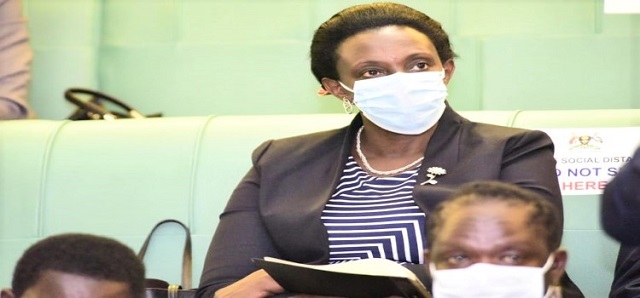
Kampala, Uganda | THE INDEPENDENT | The House has adopted a report by its committee on Legal and Parliamentary Affairs in which MPs recommended additional budgetary allocation to the Electoral Commission (EC) to cater for administrative units elections, transfers to political parties and others.
This followed the presentation of a report by the Committee chairperson, Robinah Rwakoojo in a plenary sitting on Wednesday.
Government has proposed an allocation of 111.3 billion Shillings total budget to the Electoral Commission in the next financial year 2022/2023, from 183.96 billion in the current financial year 2021/2022.
In her report, Rwakoojo recommended that government provides an additional 72.69 billion to the Electoral Commission to enable it conduct elections for the Local Council I and II Administrative Units and elections for Women Councils and Committees from village to national level across the country. The elections are directed under Section 170(1) of the Local Governments Act.
“The budgeted cost for these elections is 90.68 billion but only 17.98 billion has been provided leaving a shortfall of 72.69 billion,” says Rwakoojo.
Simon Byabakama, the Electoral Commission chairperson recently told MPs that they plan to conduct the Local Council I and II elections before August 2023, and that one of the activities to be conducted include the compilation of village voters’ register, ascertaining the number of villages in the country and others.
Section 170 of the Local Governments Act provides that the Chairpersons Local Councils and Administrative Councils shall be elected every five years.
The current local council leaders were elected in August 2018 and their term of office expires in August 2023. Before 2018, Uganda had taken a period of 16 years without electing Local Council leaders.
Byabakama said that it is important to hold the elections before the expiry of the current term so that the remaining period is used for a smooth handover to the newly elected leaders.
Meanwhile, Rwakoojo also recommended that another 35 billion is availed to the electoral body for transfers to political parties in line with Section 14A of the Political Parties and Organisations Act, 2005.
“Government has been providing 10 billion every year towards the operations of Political Parties and Organisations with representation in Parliament. At the end of December 2021, Parliament approved a supplementary budget of 35 billion bringing the total to 45 billion. Only 10 billion provision was made in the Medium Term Expenditure Framework for this purpose in the financial year 2022/2023 leaving a shortfall of 35 Billion,” Rwakoojo reported.
The Legal and Parliamentary Affairs Committee further recommended 11.17 billion allocation to EC for outstanding wage bill in line with the 2017 resolution of parliament for EC enhanced remuneration to be implemented within 3 financial years effective 2017/2018.
Parliament learnt that the Ministry of Finance only released the first two installments of 25.91 billion, and the third and final installment of 11.17 billion which was due in 2019/2020 has not been honored to date.
Also approved by parliament is a recommendation of 7.26 billion to operationalize offices in ten new cities and Terego district. The cities include Jinja, Mbarara, Gulu, Arua, Masaka, Fort Portal, Mbale, Soroti, Hoima and Lira. The cities came into effect effective 1st July, 2020.
Parliament adopted the report without debate and the Speaker of Parliament, Anita Among sent the recommendations to the Budget Committee for consideration and consolidation in the National Budget.
*****
URN
 The Independent Uganda: You get the Truth we Pay the Price
The Independent Uganda: You get the Truth we Pay the Price





